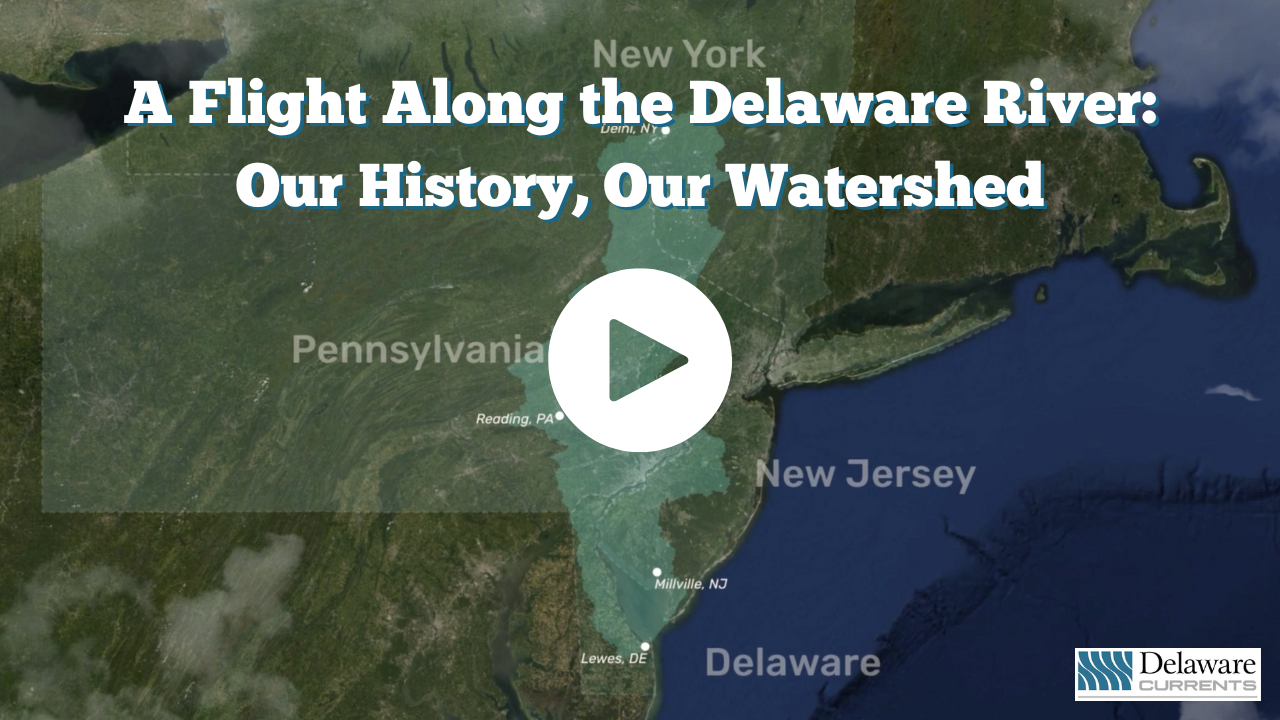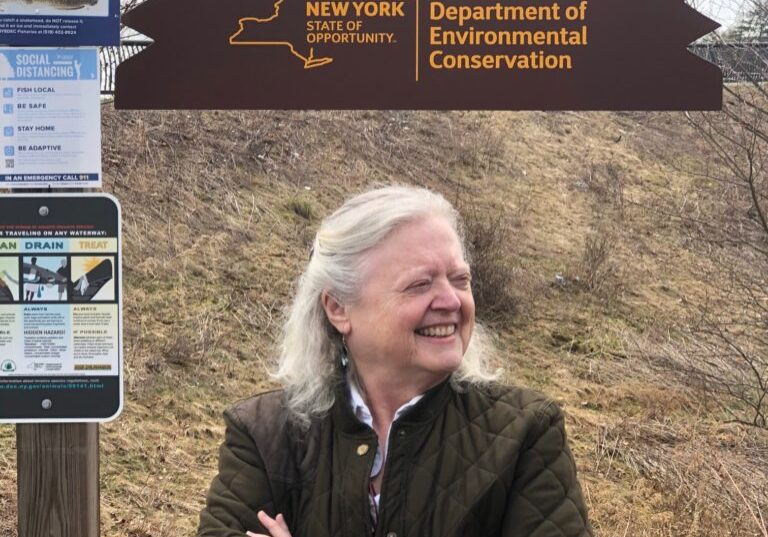
DRBC urged to be a bulwark against climate change
| December 7, 2024
After the Delaware River Basin Commission meeting on Thursday, there was a public comments session and the comments, while not part of the official record of the meeting, merit a story recognizing them.
The comments were largely focused on the threats posed by climate change and speakers encouraged the DRBC to be a bulwark against those threats by using, and perhaps expanding, its powers to protect the whole ecosystem. I was able to get the written copies of many of the speakers’ remarks. Because of the 3-minute time constraint, some of the written remarks may differ slightly from what you heard.
Largely, it needs to be pointed out, the DRBC’s focus is the river, its water quality and quantity. It does have veto power over the thousands of projects in the watershed that involve water extraction and waste water. But in the nine-and-a-half years I’ve been attending its meetings, I’ve never seen it do that. It does work with applicants to get them where the applications can be approved.
Anyway, here are the comments. (Not all of the speakers are listed here.)
Delaware Riverkeeper Network
First up, Tracy Carluccio, deputy director of the Delaware Riverkeeper Network, which is a member of the Delaware River Frack Ban and Climate Action Coalition.
She reminded listeners of the connection between rising temperatures and dry conditions, as water evaporates more quickly when temperatures rise. In addition, higher temperatures mean less snow. She noted that climate change has brought more flooding and droughts.
She quoted the Center for Climate and Energy Solutions: “Recent U.S. droughts have been the most expansive in decades. At the peak of the 2012 drought, the most extensive drought since the 1930s, an astounding 81 percent of the contiguous United States, was under at least abnormally dry conditions.”
She urged the DRBC to act. First, to oppose any further deepening of the Delaware River, which, she said, “exacerbates the movement of salt upstream. Coupled with climate-induced rising sea levels, the salt front is a real problem that will get worse as the climate crisis worsens.”
A side note: Many of the commercial interests in the watershed states support the dredging, which would allow even larger ships to make it upriver, viewing it as an economic necessity. The second request concerned what the DRBC should not do.
“More water storage is not the silver-bullet answer to precipitation deficits and it has enormous harmful environmental costs. Water conservation, prohibition of out-of-basin transfers, reducing depletive and consumptive uses of nonessential water uses, limiting land development, and retaining stormwater and preventing cutting of forests to allow for aquifer recharge at all times, not only during dry conditions or drought but at all times, are all actions within DRBC’s wheelhouse and are far more effective and economical.”
Lastly, she encouraged the commissioners to make use of the DRBC’s own Advisory Committee on Climate Change to help them “make policy decisions that will aid in combatting climate changes here.”
Read how the DRBC declared a water supply emergency.
Environment New Jersey
Next up, Doug O’Malley, director of Environment New Jersey. His group is also a member of the Delaware River Frack Ban and Climate Action Coalition. He spoke about “the moment we’re in.”
The salt front was at its fifth-highest level, close to the Philadelphia Water Department’s Baxter plant and to New Jersey-American Water Co.’s intake at Delran, N.J.
He echoed some of Carluccio’s statements, connecting less rain and the effects of heat. He encouraged the DRBC to view all the projects it reviews with an eye to climate-change impacts.
“This is a wake-up call for what various impacts of climate change will look like for the watershed,” he said.
National Parks Conservation Association
Renee Reber, the Mid-Atlantic Climate and Clean Water Program Manager for the National Parks Conservation Association, brought up a potential threat to the watershed’s energy and water supplies: data centers.
She noted that there is a potential for a data center to be located in Upper Mount Bethel Township, Pa., in Northampton County, adjacent to the Delaware River. More about that project in an earlier Delaware Currents story.
Though the data center is not a sure thing, it is likely that data centers would be coming to the watershed. She asked that the “DRBC assess the potential impacts data centers could have to the water resources in the basin, in order to properly plan for these impacts, especially in the context of water demand in the face of climate change and drought.
“In early October, a news article was published in the Morning Call revealing that a developer in Upper Mount Bethel Township, Pa., is in talks to potentially build a data center facility on property where community opposition this past year stopped a massive logistics center from happening.
“Why is this important? Data centers consume enormous amounts of energy and water. Data centers are large warehouses that store computers and data, housing our digital lives and security. Data centers represent a new and major water user to the basin that require considerable amounts of water withdrawals. Data centers use up to three to five million gallons of water a day. That is equivalent to what a city of 30,000 to 50,000 people uses in a year. Water is used to remove heat released as computers process and store data to prevent them from failing. Often times, communities are left unaware of the dangers of water impacts into local ecosystems and drinking water sources. According to water management data for 122 companies operating data centers, only 16 percent disclosed information about plans to manage water-related risks.”
In conclusion, she said, “We are concerned, because we have already seen severe impacts on parks in nearby Virginia that could be replicated at national park units along the Delaware River without pre-emptive action. Data centers and their enormous appetite for energy and water consumption are coming to the basin. The Upper Mount Bethel Township site may offer DRBC its first opportunity to regulate a project in this sector. I urge the commissioners and the DRBC to be proactive, assess the potential impacts data centers could pose, and put on the appropriate guardrails to protect the basin’s water resources.”
Damascus Citizens for Sustainability
Barbara Arrindell, director of Damascus Citizens for Sustainability, also encouraged the commissioners to take advantage of the expertise of the Advisory Committee on Climate Change.
Note: The DRBC has several advisory committees, which, according the DRBC website, “provide a forum for the exchange of information and viewpoints on a variety of issues, enhancing communication and coordination.” Their meetings are also open to the public.
Arrindell emphasized, “Not all dockets need to be approved.” She agreed with the concerns about the various threats as expressed by other speakers, but she had especially harsh words for the practice, in Pennsylvania, of using the waste water from fracking to treat roads in the winter. She did say that it was a practice used “mostly outside the watershed.”
Waterspirit
Rachel Davis, public policy and justice organizer for Waterspirit, a spiritual ecology nonprofit dedicated to the well-being of New Jersey’s watersheds and beyond, also spoke.
“Water is sacred. It sustains life in every way — physically, ecologically, and spiritually. Our relationship with water is vital, and as stewards of the land, we must protect it for the generations to come. While the Delaware River provides drinking water for millions, supports agriculture, sustains ecosystems, and offers recreational opportunities, the river faces growing threats from drought, water scarcity, and climate change, which jeopardize the health of the basin.
“We must reduce reliance on fossil fuels, invest in renewable energy, and protect natural systems. We all must protect the sacredness of water through actions like promoting green infrastructure and sustainable water practices in agriculture.”
Berks Gas Truth
Lastly, Karen Feridun, founder of Berks Gas Truth, focused her comments on a recent paper from Rutger’s Climate and Energy Institute and noted that Marjorie Kaplan, the senior associate director of the institute, serves on the commission’s Advisory Committee on Climate Change.
She used the expertise displayed in the paper to encourage listeners not to rely on the specific degree of warming that we should achieve but rather to act on events that have meaning for citizens.
“Kaplan’s colleague, Robert Kopp, explains that framing the discussion around what they are calling ‘focusing events,’ like widespread wildfires, protracted drought and intense heat waves and flooding, may be more useful in inspiring collective action.”
Feridun, too, encouraged the DRBC to “take fuller advantage of the expert advisors like Kaplan who are serving on your advisory committee.”


![DC_Image [Image 4_Assunpink Meets Delaware] meets Delaware The Assunpink Creek on its its way to meet the Delaware River. The creek passes through woods, industrial and commercial areas and spots both sparkling and filled with litter.](https://delawarecurrents.org/wp-content/uploads/bb-plugin/cache/DC_Image-4_Assunpink-meets-Delaware-1024x768-landscape-14f069364113da5e8c145e04c9f2367c-.jpg)



